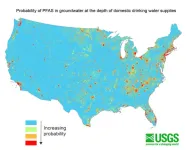(Press-News.org) PEMBROKE, N.H. — Approximately 71 to 95 million people in the Lower 48 states – more than 20% of the country’s population – may rely on groundwater that contains detectable concentrations of per- and polyfluoroalkyl substances, also known as PFAS, for their drinking water supplies. These findings are according to a U.S Geological Survey study published Oct. 24.
The predictive model results can help members of the public, water suppliers and regulators understand the potential for PFAS contamination, guide future studies and inform strategic planning for water resources.
USGS scientists are the first to report national estimates of PFAS occurrence in untreated groundwater that supplies water to public and private wells. This research also provides the first estimate of the number of people across the country who are potentially affected by PFAS-contaminated groundwater.
Along with a scientific report, the USGS published an interactive, online map so users can see probability estimates of PFAS occurrence. Note that predictive results are intended to be evaluated at state, regional and national scales rather than at individual household levels. Probability estimates are for the presence of PFAS in groundwater and do not account for any subsequent actions taken by states, municipalities or individuals to treat drinking water. The model does not include estimates of PFAS concentrations; testing is the only way to confirm the presence of contaminants.
Exposure to certain PFAS may lead to adverse health risks in people, according to the U.S. Environmental Protection Agency. PFAS are a group of synthetic chemicals used in a wide variety of common applications, from the linings of fast-food boxes and non-stick cookware to fire-fighting foams and other purposes. PFAS are commonly called “forever chemicals” because many of them do not easily break down and can build up over time, making them a concern for drinking water quality.
“This study’s findings indicate widespread PFAS contamination in groundwater that is used for public and private drinking water supplies in the U.S.,” said Andrea Tokranov, USGS research hydrologist and lead author of this study. “This new predictive model can help prioritize areas for future sampling to help ensure people aren’t unknowingly drinking contaminated water. This is especially important for private well users, who may not have information on water quality in their region and may not have the same access to testing and treatment that public water suppliers do.”
The EPA has established legally enforceable levels, called maximum contaminant levels, for six types of PFAS in drinking water. The EPA regulates public water supplies, and some states have additional regulations for drinking water. Some homes use private water supplies, where residents are responsible for the maintenance, testing and treatment of their drinking water. Those interested in treatment processes and testing options can read EPA’s guidance or contact their state officials or water supplier.
The states with the largest populations relying on public water supplies with potentially contaminated groundwater sources are Florida and California. Regarding private wells, Michigan, Florida, North Carolina, Pennsylvania, New York and Ohio have the largest populations relying on potentially contaminated groundwater.
The study also presents data according to population percentage. In Massachusetts, for example, the source water for 86 to 98% of people who rely on groundwater from public water supplies could be contaminated with PFAS. In Connecticut, the source water for 67 to 87% of the people who rely on groundwater from private wells could be affected. Details by state can be seen in the report’s tables S6 through S8.
“To derive these estimates, the team analyzed 1,238 groundwater samples collected by USGS scientists and determined how factors such as urban development and well depth can impact PFAS occurrence,” continued Tokranov. “With that information, a detailed machine learning model was developed and used to identify which geographic areas have a higher likelihood for contamination. That information was combined with existing USGS research on the number of people in a given area who rely on groundwater for drinking water to establish population estimates.”
Scientists present separate estimates for public and private wells because they typically receive water from different groundwater depths. Public wells using groundwater as the primary water source are usually deeper than private wells.
There are more than 12,000 types of PFAS, not all of which can be detected with current tests; the USGS study tested for the presence of 24 common types. The USGS estimates consider the presence of at least one of those 24 types of PFAS. The most frequently detected compounds were perfluorobutane sulfonate known as PFBS, perfluorooctane sulfonate known as PFOS and perfluorooctanoate known as PFOA.
This research provides a broad outlook for the Lower 48 states and presents state-level estimates. Scientists did not look in detail at specific cities or provide estimates for the types of PFAS present or PFAS concentrations.
The new USGS study was published in Science.
Learn more about USGS research on PFAS by reading the USGS strategy for the study of PFAS in the environment and visiting the USGS PFAS Integrated Science Team’s website.
For more information about PFAS regulations, visit the EPA’s website on addressing PFAS.
# # #
The USGS provides science for a changing world. Learn more at www.usgs.gov or follow us on Facebook @USGeologicalSurvey, YouTube @USGS, Instagram @USGS, or Twitter @USGS.
END
New Zealand’s native stoneflies have changed colour in response to human-driven environmental changes, new research shows.
Just published in the journal Science, the University of Otago study provides arguably the world’s most clear-cut case of animal evolution in response to change made by humans.
Co-author Professor Jon Waters, of the Department of Zoology, says the stonefly has become a different colour due to recent deforestation.
“In natural forested regions, a native species has evolved ‘warning’ colours that mimic those of a poisonous forest species, to trick predators into ...
As renewable energy sources such as wind and solar become more widespread, managing the power grid has become increasingly complex. Researchers at the University of Virginia have developed an innovative solution: an artificial intelligence model that can address the uncertainties of renewable energy generation and electric vehicle demand, making power grids more reliable and efficient.
Multi-Fidelity Graph Neural Networks: A New AI Solution
The new model is based on multi-fidelity graph neural networks (GNNs), ...
One in five children has an identified mental health problem as early as age 3. Early detection is key to earlier intervention, and it also could prevent more severe conditions down the line, such as ADHD, depression and anxiety. Pediatric primary care is an ideal setting to conduct screening for mental health risk, given that pediatricians tend to have close, ongoing relationships with young patients and their families, and broad reach to historically marginalized communities. Since mental health screening of toddlers in primary care is uncommon, it is important to train pediatricians to do so without implicit bias and in a way that prevents unintended ...
EL PASO, Texas (Oct. 24, 2024) – Researchers at The University of Texas at El Paso have created a portable device that can detect colorectal and prostate cancer more cheaply and quickly than prevailing methods. The team believes the device may be especially helpful in developing countries, which experience higher cancer mortality rates due in part to barriers to medical diagnosis.
“Our new biochip device is low-cost — just a few dollars — and sensitive, which will make accurate disease diagnosis accessible to anyone, ...
Dr. Kevin J. Kelly, an assistant professor in the Department of Physics and Astronomy at Texas A&M University and a member of the George P. and Cynthia Woods Mitchell Institute for Fundamental Physics and Astronomy, has been selected as the 2025 recipient of the American Physical Society’s Henry Primakoff Award for Early-Career Particle Physics in recognition of his contributions and promising career potential in fundamental particle physics and cosmology.
Kelly, who joined the Texas A&M faculty in 2022, works at the interface of two of the biggest outstanding mysteries in particle physics: ...
Climate change is driving more extreme heat and more air pollution from wildfires, each of which put human health at risk. Now, new research funded by the federal Agency for Healthcare Research and Quality (AHRQ) and led by University of Maryland School of Public Health Professor Dr. Amir Sapkota, will study how these hazards independently and jointly impact already vulnerable groups, such as people living with end stage kidney disease (ESKD). The researchers aim to identify preventative solutions.
“During extreme heat, the damaged kidneys of people with ESKD do not regulate fluid levels very ...
Researchers from Johns Hopkins Children’s Center say they have identified a gene pathway involving the mineral zinc in mice that may someday point the way to using zinc-based supplements to directly help people with a rare disorder called short bowel syndrome (SBS).
The findings, published Oct. 7 in Nature Communications, help advance efforts toward more effective, potential treatment regimens for both children and adults with the debilitating condition.
SBS, which affects 10,000–20,000 adults and children in the United States, is marked by damage to and shortening of ...
Sergei Kalinin, a professor in the Department of Materials Science and Engineering, has been named the winner of the David Adler Lectureship Award in the Field of Materials Physics by the American Physical Society. The award recognizes one outstanding contributor in the field of materials physics who is notable for high-quality research, review articles, and lecturing.
“I am deeply honored to receive the Adler Award, as it recognizes the critical transition in materials discovery that my colleagues at the University of Tennessee and Pacific Northwest National Laboratory and I have championed,” ...
Few people are fans of stink bugs, mosquitoes, or boll weevils, but insects play a key role in the circle of life that makes up the planet’s environment. In fact, world-renowned biologist E. O. Wilson famously declared that if insects vanished, our environment would collapse.
Scientists have noted that insect behaviour has been changing, and their populations are declining – on average 2-3% per year. This has prompted them to investigate the potential causes of this change, such as habitat loss due to overdevelopment, climate change, and chemical use.
EMBL researchers and collaborators recently investigated how pesticides, herbicides, ...
A team led by researchers at MIT has discovered that a distant interstellar cloud contains an abundance of pyrene, a type of large, carbon-containing molecule known as a polycyclic aromatic hydrocarbon (PAH).
The discovery of pyrene in this far-off cloud, which is similar to the collection of dust and gas that eventually became our own solar system, suggests that pyrene may have been the source of much of the carbon in our solar system. That hypothesis is also supported by a recent finding that samples returned from the near-Earth asteroid Ryugu contain large quantities of pyrene.
“One of the big questions in ...







